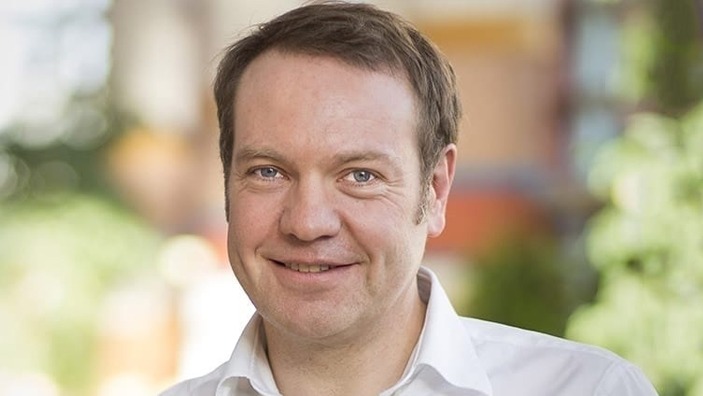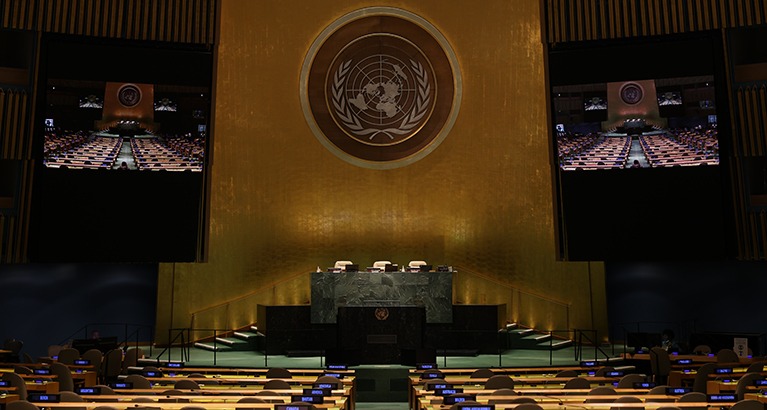Professor of Innovation and Organisation
Vice Dean for Research and Impact
Co-Director of the Cambridge Centre for Social Innovation
Fellow of Hughes Hall
BA, PhD (Stirling University)
My research interests include entrepreneurship, institutions and institutional change, regional innovation, and social innovation. I’m a Visiting Professor in the Department of Management and Marketing at the University of Melbourne and a member of the Cambridge Corporate Governance Network. I serve as an Associate Editor at the Academy of Management Review.
I’m part of the Organisational Theory and Information Systems subject group at Cambridge Judge Business School, which is engaged with cross-disciplinary themes including leadership.

Professional experience
Prior to joining Cambridge Judge Business School, Paul was Assistant Professor of Entrepreneurship at Warwick Business School. He has also held posts at the School of Geography at Oxford University and the Centre for Entrepreneurship at the University of Newcastle. Paul serves on the editorial boards of the Academy of Management Journal, and Strategic Organization, has previously served on the editorial boards of Administrative Science Quarterly and Entrepreneurship Theory & Practice, and is an Associate Editor of Academy of Management Review, and Innovation: Organization and Management. He is Visiting Professor in the Department of Management and Marketing at the University of Melbourne, a member of the Cambridge Corporate Governance Network (CCGN), Fellow in Clayton State University’s Center for Social Innovation & Sustainable Entrepreneurship, and a Visiting Social Innovator at Memorial University’s Centre for Social Enterprise, Newfoundland, Canada.
Publications
- Selected publications
- Journal articles
- Special issues of journals
- Books, monographs, reports and case studies
- Book chapters
- Working papers
Selected publications
- Tracey, P., Dalpiaz, E. and Phillips, N. (2018) “Fish out of water: translation, legitimation and new venture creation.” Academy of Management Journal, 61(5): 1627-1666 (DOI: 10.5465/amj.2015.0264)
- Tracey, P. and Phillips, N. (2016) “Managing the consequences of organizational stigmatization: identity work in a social enterprise.” Academy of Management Journal, 59(3): 740-765 (DOI: 10.5465/amj.2013.0483)
- Tracey, P., Heide, J.B. and Bell, S.J. (2014) “Bringing ‘place’ back in: regional clusters, project governance, and new product outcomes.” Journal of Marketing, 78(6): 1-16
- Tracey, P., Phillips, N. and Jarvis, O. (2011) “Bridging institutional entrepreneurship and the creation of new organizational forms: a multilevel model.” Organization Science, 22(1): 60-80 (DOI: 10.1287/orsc.1090.0522)
- Dacin, M.T., Dacin, P.A. and Tracey, P. (2011) “Social entrepreneurship: a critique and future directions.” Organization Science, 22(5): 1203-1213 (DOI: 10.1287/orsc.1100.0620)
- Bell, S., Tracey, P. and Heide, J.B. (2009) “The organization of regional clusters.” Academy of Management Review, 34(4): 623-642
Journal articles
- Neuberger, I., Mattioli, F., Richards, H., Nyilasy, G. and Tracey, P. (2025) “Intermediated legitimation: how founders build new venture legitimacy among make-or-break audiences.” Academy of Management Journal (DOI: 10.5465/amj.2022.1258) (published online Dec 2024)
- Tracey, P. and Stott, N. (2025) “Constructing ‘problems’ and ‘solutions’: social innovation as social-symbolic work.” Journal of Management Studies (DOI: 10.1111/joms.13239) (published online May 2025)
- Wang, M.S. and Tracey, P. (2024) “Anti-stigma organizing in the age of social media: social movement organizations leverage affordances to build solidarity.” Academy of Management Review, 49(4): 799-823 (DOI: 10.5465/amr.2021.0388)
- George, G., Hass, M.R., McGahan, A.M., Schillebeeckx, S.J.D. and Tracey P. (2023) “Purpose in the for-profit firm: a review and framework for management research.” Journal of Management, 49(6):1841-1869 (DOI: 10.1177/01492063211006450)
- Neuberger, I., Kroezen J. and Tracey, P. (2023) “Balancing ‘protective disguise’ with ‘harmonious advocacy’: social venture legitimation in authoritarian contexts.” Academy of Management Journal, 66(1): 67-101 (DOI: 10.5465/amj.2020.0517)
- Heide, J.B., Bell, S.J. and Tracey, P. (2022) “Who we are and how we govern: the effect of identity orientation on governance choice.” Journal of Marketing, 87(1): 45-63 (DOI: 10.1177/00222429221094027)
- Cappellaro, G., Tracey, P. and Greenwood, R. (2020) “From logic acceptance to logic rejection: the process of destabilization in hybrid organizations.” Organization Science, 31(2): 245-534 (DOI: 10.1287/orsc.2019.1306)
- Claus, L. and Tracey, P. (2020) “Making change from behind a mask: how organizations challenge guarded institutions by sparking grassroots activism.” Academy of Management Journal, 63(4): 965–996 (DOI: 10.5465/amj.2017.0507)
- Hampel, C.E., Tracey, P. and Weber, K. (2020) “The art of the pivot: how new ventures manage identification relationships with stakeholders as they change direction.” Academy of Management Journal, 63(2): 440–471 (DOI: 10.5465/amj.2017.0460)
- Stott, N. and Tracey, P. (2018) “Organizing and innovating in poor places.” Innovation: Organization and Management, 20(1): 1-17 (DOI: 10.1080/14479338.2017.1358093)
- Tracey, P., Dalpiaz, E. and Phillips, N. (2018) “Fish out of water: translation, legitimation and new venture creation.” Academy of Management Journal, 61(5): 1627-1666 (DOI: 10.5465/amj.2015.0264)
- Kyratsis, Y., Atun, R., Phillips, N., Tracey, P. and George, G. (2017) “Health systems in transition: professional identity work in the context of shifting institutional logics.” Academy of Management Journal, 60(2): 610-641 (DOI: 10.5465/amj.2013.0684)
- Hampel, C. and Tracey, P. (2017) “How organizations move from stigma to legitimacy: the case of Cook’s travel agency in Victorian Britain.” Academy of Management Journal, 60(6): 2175-2207 (DOI: 10.5465/amj.2015.0365)
- Prabhu, J., Tracey, P. and Hassan, M. (2017) “Marketing to the poor: an institutional model of exchange in emerging markets.”AMS Review, 7(3-4): 101–122 (DOI: 10.1007/s13162-017-0100-0)
- Smith, W.K., Erez, M., Jarvenpaa, S., Lewis, M.W. and Tracey, P. (2017) “Adding complexity to theories of paradox, tensions, and dualities of innovation and change.”Organization Studies, 38(3-4): 303-317 (DOI: 10.1177/0170840617693560)
- Tracey, P. and Stott, N. (2017) “Social innovation: a window on alternative ways of organizing and innovating.”Innovation: Organization and Management, 19(1): 51-60 (DOI: 10.1080/14479338.2016.1268924)
- Smith, W. and Tracey, P. (2016) “Institutional complexity and paradox theory: complementarities of competing demands.”Strategic Organization, 14(4): 455-466 (DOI: 10.1177/1476127016638565)
- Tracey, P. (2016) “Spreading the word: the microfoundations of institutional persuasion and conversion.”Organization Science, 27(4): 989-1009 (DOI: 10.1287/orsc.2016.1061)
- Tracey, P. and Phillips, N. (2016) “Managing the consequences of organizational stigmatization: identity work in a social enterprise.”Academy of Management Journal, 59(3): 740-765 (DOI: 10.5465/amj.2013.0483)
- Dalpiaz, E., Tracey, P. and Phillips, N. (2014) “Succession narratives in family business: the case of Alessi.”Entrepreneurship Theory and Practice, 38(6): 1375-1394 (DOI: 10.1111/etap.12129)
- Tracey, P., Heide, J.B. and Bell, S.J. (2014) “Bringing ‘place’ back in: regional clusters, project governance, and new product outcomes.” Journal of Marketing, 78(6): 1-16
- Tracey, P. and Schluppeck, D. (2014) “Neuroentrepreneurship: ‘brain pornography’ or new frontier in entrepreneurship research?”Journal of Management Inquiry, 23(1): 101-103 (DOI: 10.1177/1056492613485915)
- Phillips, N., Tracey, P. and Karra, N. (2013) “Building entrepreneurial tie portfolios through strategic homophily: the role of narrative identity work in value creation and early growth.” Journal of Business Venturing, 28(1): 134-150 (DOI: 10.1016/j.jbusvent.2011.12.002)
- Lawrence, T., Phillips, N. and Tracey, P. (2012) “Educating social entrepreneurs and social innovators.”Academy of Management Learning and Education, 11(3): 319-323 (DOI: 10.5465/amle.2012.0224)
- Tracey, P. (2012) “Religion and organization: a critical review of current trends and future directions.” Academy of Management Annals, 6(1): 87-134 (DOI: 10.1080/19416520.2012.660761)
- Dacin, M.T., Dacin, P.A. and Tracey, P. (2011) “Social entrepreneurship: a critique and future directions.” Organization Science, 22(5): 1203-1213 (DOI: 10.1287/orsc.1100.0620)
- Tracey, P. and Phillips, N. (2011) “Entrepreneurship in emerging markets: strategies for new venture creation in uncertain institutional contexts.” Management International Review, 51(1): 23-39 (DOI: 10.1007/s11575-010-0066-8)
- Tracey, P., Phillips, N. and Jarvis, O. (2011) “Bridging institutional entrepreneurship and the creation of new organizational forms: a multilevel model.” Organization Science, 22(1): 60-80 (DOI: 10.1287/orsc.1090.0522)
- Dacin, M.T., Munir, K. and Tracey, P. (2010) “Formal dining at Cambridge colleges: linking ritual performance and institutional maintenance.” Academy of Management Journal, 53(6): 1393-1418
- Di Domenico, M., Haugh, H. and Tracey, P. (2010) “Social bricolage: theorizing social value creation in social enterprises.” Entrepreneurship Theory and Practice, 34(4): 681-703
- Eisingerich, A.B., Bell, S. and Tracey, P. (2010) “How can clusters sustain performance? The role of network strength, network openness, and environmental uncertainty.” Research Policy, 39(2): 239-253
- Moizer, J. and Tracey, P. (2010) “Strategy making in social enterprise: the role of resource allocation and its effects on organizational sustainability.” Systems Research and Behavioral Science, 27(3): 252-266 (DOI: 10.1002/sres.1006)
- Bell, S., Tracey, P. and Heide, J.B. (2009) “The organization of regional clusters.” Academy of Management Review, 34(4): 623-642
- Kneiding, C. and Tracey, P. (2009) “Towards a performance measurement framework for community development finance institutions in the UK.” Journal of Business Ethics, 86(3): 327-345
- Di Domenico, M., Tracey, P. and Haugh, H. (2009) “The dialectic of social exchange: theorising corporate-social enterprise collaboration.” Organization Studies, 30(8): 887-907 (DOI: 10.1177/0170840609334954)
- Di Domenico, M., Tracey, P. and Haugh, H. (2009) “Social economy involvement in public service delivery: community engagement and accountability.” Regional Studies, 43(7): 981-992
- Phillips, N. and Tracey, P. (2009) “Dialogue: institutional theory and the MNC.” Academy of Management Review, 34(1): 169-171
- Phillips, N., Tracey, P. and Karra, N. (2009) “Rethinking institutional distance: strengthening the tie between new institutional theory and international management.” Strategic Organization, 7(3): 339-348
- Karra, N., Phillips, N. and Tracey, P. (2008) “Building the born global firm: developing entrepreneurial capabilities for international new venture success.” Long Range Planning, 41(4): 440-458
Special issues of journals
- Smith, W.K., Erez, M., Jarvenpaa, S., Lewis, M.W. and Tracey, P. (eds.) (2017) “Special issue on paradox, tensions and dualities of innovation and change.” Organization Studies, 38(3-4)
Books, monographs, reports and case studies
- George, G., Haas, M.R., Joshi, H., McGahan, A.M. and Tracey, P. (eds.) (2022) Handbook on the business of sustainability: the organization, implementation, and practice of sustainable growth. Cheltenham: Edward Elgar.
- George, G., Baker, T., Tracey, P. and Joshi, H. (eds.) (2019) Handbook of inclusive innovation: the role of organizations, markets and communities in social innovation. Cheltenham: Edward Elgar.
- Tracey, P., Phillips, N. and Lounsbury, M. (eds.) (2014) Research in the sociology of organizations: vol.41: religion and organization theory. Bingley: Emerald Group Publishing.
- Clark, G.L. and Tracey, P. (2004) Global competitiveness and innovation: an agent-centred perspective. Houndmills: Palgrave Macmillan.
Book chapters
- Hampel, C., Lawrence, T.B. and Tracey, P. (2017) “Institutional work: taking stock and making it matter.” In: Greenwood, R., Oliver, C., Lawrence, T.B. and Meyer, R. (eds.) The SAGE handbook of organizational institutionalism. London: Sage, 2nd edition, pp.558-590
- Tracey, P and Creed, W.E.D. (2017) “Beyond managerial dilemmas: the study of institutional paradoxes in organization theory. In: Smith, W.K., Lewis, M.W., Jarzabkowski, P. and Langley, A. (eds.) The Oxford handbook of organizational paradox. Oxford: Oxford University Press, pp.162-177
- Tracey, P., Phillips, N. and Lounsbury, M. (2014) “Taking religion seriously in the study of organizations.” In: Tracey, P., Phillips, N. and Lounsbury, M. (eds.): Research in the sociology of organizations: vol.41: religion and organization theory. Bingley: Emerald Group Publishing, pp.3-21
- Tracey, P. (2012) “Entrepreneurship and neo-institutional theory.” In: Mole, K. and Ram, M. (eds.) Perspectives in entrepreneurship: a critical approach. Houndmills: Palgrave Macmillan, pp.93-106
Working papers
- Stott, N., Tracey, P. and Dwight, S. (2025) “Social exits.” Critical Perspectives on Social Innovation Series, No.2025/2. Cambridge: Cambridge Centre for Social Innovation.
- Stott, N., Pendlebury, J., Muruven, D. and Tracey, P. (2025) “Climate peaceshaping.” Critical Perspectives on Social Innovation Series, No.2025/1. Cambridge: Cambridge Centre for Social Innovation.
- Stott, N., Pendlebury, J. and Tracey, P. (2024) “Peaceshaping.” Critical Perspectives on Social Innovation Series, No.2024/4. Cambridge: Cambridge Centre for Social Innovation.
- Tracey, P. and Stott, N. (2024) “Social innovation and the UN Sustainable Development Goals: five blockages to progress.” Critical Perspectives on Social Innovation Series, No.2024/1. Cambridge: Cambridge Centre for Social Innovation.
Awards and honours
- Academy of Management Journal Best Article Award (with Laura Claus), 2021
- European Group of Organization Studies Best Paper Award (with Lilia Giugni), 2020
- ESRC Mid-Career Fellowship, April 2011-March 2013
News and insights
Governance, economics and policy
Put your resources to work: strategies for business success
Change is the very nature of business – especially successful businesses. Times change, customer needs change and the attractiveness of different market sectors change over time. Effective allocation of resources is essential to meet the demands of such change, finds research at Cambridge Judge Business School.
Research centre news
New study: Gaza and Ukraine demonstrate urgent need for UN reform
Cambridge Judge researchers propose meta-organisational reform to address peacekeeping failures in Gaza, Ukraine and beyond.
Social impact
A new framework for social innovation
The goals of social innovation often win broader acceptance than the specific approaches taken. Cambridge researchers are redefining social innovation to overcome resistance and moving beyond market-based solutions.
Media coverage
Stanford Social Innovation Review | 11 January 2020
Researchers explain how international NGOs pursue advocacy in the face of government opposition
A research paper co-authored at Cambridge Judge Business School reconstructs how an international children’s rights organisation worked in Indonesia to disrupt highly institutionalised child marriage. The paper by Dr Laura Claus and Professor Paul Tracey examines how NGOs navigate such obstacles.
IEDP | 12 July 2019
The art of the strategic pivot
Research co-authored by Paul Tracey, Professor of Innovation and Organisation at Cambridge Judge Business School, looks at how business leaders can pivot when necessary yet maintain good relations with their stakeholders. “Ventures can remove the affective hostility of stakeholders and rebuild connections with many of them by exposing their struggles,” the study says.




